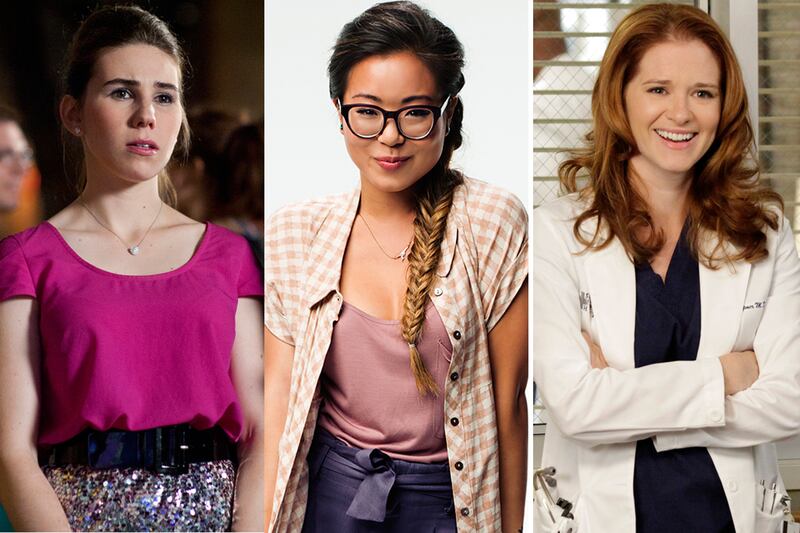It used to be that a television character losing her virginity wasn’t all that different from the way most girls thought it would go down in real life: The attractive high-school or college-age protagonist finds a compatible mate, and after a few months of back-and-forth and some overanalysis from friends, family, and fans, she waits for a sweeps month to decide that—just like Brenda Walsh (Shannen Doherty) on prom night on Beverly Hills, 90210 or Joey Potter (Katie Holmes) on a senior ski trip on Dawson’s Creek—now would be a good time to have her first consummation.
Or maybe it doesn’t happen right then, but it will the next time. Or if not then, then the time after—maybe.
Which brings us to Sophia Swanson. On the MTV comedy-drama Underemployed, Sophia (Michelle Ang) is the conservative one in a group of recently graduated 20-somethings trying to get their careers and lives started after receiving their diplomas. Although she’s just as intelligent and attractive as the other female characters, Sophia graduated college a virgin—finally losing it in the show’s pilot after a surprise drink invitation and subsequent barroom flirtation lands her in bed with a new acquaintance (and a woman, no less!).
ADVERTISEMENT
This encounter allowed Sophia to join the ranks of Zosia Mamet’s Sex and the City–obsessed Shoshanna Shapiro on HBO’s Girls and Sarah Drew’s high-strung, overachieving April Kepner on ABC’s Grey’s Anatomy as a new member of the later-than-expected-deflowerment club.
And despite what the media may have led us to believe, the idea of a 20-something virgin isn’t that far off from real life. An October 2011 report from the U.S. Department of Health and Human Services showed that the percentage of teenagers having sex has actually gone down since the late 1980s, remaining at roughly 47 percent since 2001.
It can also make for interesting characters, both real and fictional.

“We’re living in a time where everyone is eager to brand themselves,” said Craig Wright, the creator of Underemployed. “Everybody wants to be specific and recognizable and interesting, and certainly cultivating your virginity as a public fact is one way to set yourself apart.”
Wright suggested that this idea is particularly relevant to millennials and drew comparisons to “people in Brooklyn making pickles and homemade items.”
“The whole hipster home-brew revolution, I think, is tied into some new notions of localism and integrity, which are finally come home to roost on the body,” he said. “People are finding it to be interesting to do something special with your life, with your body. There’s a craving for specificity.”
While these shows’ audiences skew older, they are recent deviations from the more typical treatment of sex (commonplace, expected, frequent) on teen dramas today. The current season of the CW’s Gossip Girl featured Chace Crawford’s Nate Archibald engaged in a relationship with a high-school girl. The notion of her already being sexually active is assumed as a given.
The teen characters on MTV’s Teen Wolf and the CW’s The Vampire Diaries are also fairly blasé about the idea, although a mother on the former show did worry when she found condoms in her son’s room.
On ABC Family, each of the four Pretty Little Liars has had some kind of sexual experience, with a few instances being more implied than others. Series creator and executive producer I. Marlene King rarely shies away from talking about the characters’ sexual escapades, even if those relationships aren’t always age-appropriate or Family Research Council–approved. When Liar Aria’s (Lucy Hale) on-again-off-again illicit affair with her adult boyfriend, Ezra (Ian Harding), was about to reach its climax, King tweeted, “Ezria: there are two moments that everyone is waiting for. The first moment happens in a bed. [Episode] #224.” And when probed about whether Spencer (Troian Bellisario), the last of the Liars virgins, would cash in, King teased, “wait for it, wait for it.”
Meanwhile, on the same network, Switched at Birth went against stereotype and cast warm, optimistic teenager Daphne (Katie Leclerc) as the sexually experienced one who not only has few reservations about sleeping with an older man, but she is also surprised to learn that her counterpart, rebellious graffiti artist Bay (Vanessa Marano), is a virgin.
“Making Bay a virgin was never intended as some kind of shocking revelation,” Switched creator and executive producer Lizzy Weiss said of these facts, which were casually revealed toward the end of Season 1, pointing out that “a lot of teenage girls are not sexually active at 16.”
Weiss says this isn’t just a matter of changing things up, but that being a wild child and blowing off the importance of one’s first time are not mutually exclusive.
“Bay isn't a prude, but she isn't going to have sex with anyone just to get it over with,” Weiss said. “She's waiting until she feels right about the person and the moment—that could be this month, or it could be in three years. Daphne, and I guess some of our audience, was surprised by this revelation, because Bay has a lot of bravado around sexuality, but it really is just that—bravado. I think viewers assumed Daphne was a virgin because she was a ‘good girl’; a straight-A student, etc. But being a straight-A student doesn't coincide with sexuality. And Bay is as insecure, terrified, and hopeful about her first-time sexual experience as any teen girl would be.”
For these older characters, though, some constants still ring true. As is often the case with setting up a virginity storyline, these specific characters on Grey’s, Underemployed, and Girls all come from a sheltered, conservative—sometimes religious—upbringing, and they’re all fairly naive. (Girls’ Shoshanna nervously and a tad too eagerly informing a date of her situation: “I'm the least virginy virgin ever!” Grey’s April after losing her virginity to her friend and co-worker the night before her medical board exams: “I broke my promise to Jesus and now I can’t even talk to him” and “I am self destructing into a pile of sweat.” Underemployed’s Sophia’s impromptu panic-stricken request to a guy friend when her parents find him cleaning up her apartment and hiding the vibrator she—presumably—used with her new girlfriend? “Say you’re my boyfriend!”)
Also keeping with tradition, these storylines are all centered around a woman losing her virginity.
“One of the consistent things we find in teen television is that girls are expected to be in charge of the [relationship’s] sexual limits and especially the timing of sexual events,” said Jennifer Stevens Aubrey, a professor in the University of Missouri, Columbia’s communications department who studies the media’s effect on young people. “In a relationship, it’s up to the girl to decide when they’re going to have sex or sexual behaviors at all. So it would be more expected or normative for a girl to just abstain entirely and to use that as the background of a virginity storyline than it would be for boys.”
She adds that sex in TV dramas for younger viewers is “definitely telling a story about gender as well as sex. So boys are ... expected to want sex and a variety of sexual activities. It is expected for them to treat women as sexual objects. If you tie those themes with masculinity, then of course boy [viewers] are going to stray away from storylines that break away from that, because it means that the character is not masculine and therefore not valued in our culture.”
Still, TV-show creators can appreciate the dullness in overthinking sex when the moment strikes—particularly after a certain age. Neither April, Sophia, nor Shoshanna was in a committed relationship when the opportunity to have sex presented itself (although April and Shoshanna did know their suitors). There was no buildup over multiple episodes, no obsessing and long talks with significant others—it all quickly happened.
“I wouldn’t want to make that big a deal out of it,” said Underemployed’s Wright. “That’s another cultural shift. I think the average young person today is more sexually sophisticated than they were 20 years ago. Meaning that they know more about it, so I would not want to reenshrine virginity in the old-fashioned way as this holy of holy. I don’t think that serves everybody’s purposes either. There’s a middle ground where it’s important, but not cataclysmic. Where it’s natural, but still a choice.”
Wright said he doesn’t think the old TV virginity archetype is dead; it’s just evolving.
“What I like about it now is the canvas for how to tell these stories on television is so much broader,” he said. “Virginity is still a milestone in everybody’s lives; it still matters. But thank god it’s no longer about girls deciding to trade their purity for love.”





